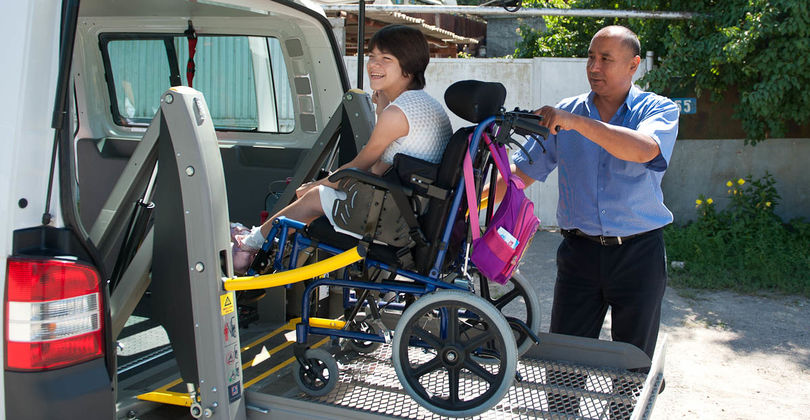Invataxi, a special free taxi service for passengers with disabilities, was established in Almaty in 2009 after the Sabi charity fund purchased 14 specially-equipped Volkswagen Caddys and Transporters and donated them to the Almaty City Society of Persons with Disabilities. The funds used to acquire the vehicles were raised during a charity auction of paintings created by Kazakh artists, as well as attained from private sponsors.
The Almaty office is managed by veteran of the Soviet conflict in Afghanistan and person with disabilities of the second degree Sergei Makhashev. The facility, which has operated at private expense for two years, is now receiving public funding.
Invataxi is available to all wheelchair users in Almaty and its database includes 1,068 registered clients. To obtain the right to use the service, a potential patron must bring an ID card, certificate of disability, individual rehabilitation programme certificate and certificate No. 035/y to the office. The taxi service is available after 9 a.m. and orders need to be registered a day before the planned transportation.
In addition to cars, which are able to transport one person in a wheelchair and one person in the back seat, the office also offers a Volkswagen Crafter bus to carry three persons in wheelchairs and three more in the rear.
“I like my job, as it is always nice to do good things for others. It may be challenging sometimes to find an individual approach to our passengers; however, you just have to start communicating with them. Usually, I transport people to the medical centres for treatment and rehabilitation. I work every day, as well as on weekends, depending on the schedule,” said driver Shauket Usmanov.
According to Diana Baiturova, whose 14-year-old daughter is a regular Invataxi client, they order a cab twice a week and are very satisfied with the service. They live in a remote district far from the city centre and it is a challenge to use public transport to get to the ARDI Medical Centre.
“We use the taxi service each time we need it, as this type of transportation is much more convenient for us. Unfortunately, it is not always possible to order a taxi. At 9:30, all the cabs are usually no longer available, so we have to call at 9 a.m. from several phones in order to get a car. I think they have a great flow of customers,” said another client, Bazan Mazhitova.
The taxi service offers a special monthly schedule for those with disabilities who are studying or working, so the person doesn’t have to call and order a car each time.
“I am studying law in Turan College, so I use Invataxi every day. I also order a car on the weekend to go to the park to get some fresh air,” said 23-year-old Zhasulan Umitkazinov.
Invataxi also offers work opportunities for citizens with disabilities. Svetlana Kerimbekova has been a call operator since 2010.
“I can implement only seated work, so I was very grateful when the Society of Disabled People of Medeu District appointed me here. We have a very friendly collective,” said Kerimbekova.
According to Invataxi deputy head Tatiana Shvachunova, the company does not have enough cars to service all those who need transportation. The total amount of public funding allows only 10 trips per car, so the office is unable to send more vehicles even when clients are waiting to order them.
“We send reports to the Labour and Social Protection Department of Almaty every month asking them to increase the financial support. However, the answer is always negative. The authorities used to claim that the budget is limited and they have to sponsor other projects for the disabled population as well. That is why we can cover only about 10 percent of all calls received in the office,” said Shvachunova.
One of Invataxi’s initiators and Kazakh Union of Organisations of Disabled People Chairman Ali Amanbayev said he saw special taxi cabs for the first time in the United States when he was there in the 1990s.
“Our service is free, while, for example, in Moscow people have to pay for that. At the same time we experience a lack of financial support, so four of our cabs are not operating. Right now our capacity allows us to transport 120 persons a day, but the experience shows that the demand is much higher. Kazakhstan ratified the UN Convention on the Rights of Persons with Disabilities on Jan. 20 this year; I hope this will change the situation. There is also a positive change, as the Invataxi service is now available in other cities of the country like Pavlodar, Aktobe, Kokshetau, Temirtau, Ust-Kamenogorsk, Uralsk, Kyzylorda, Ekibastuz, Taldykorgan, Zhezkazgan, Turkestan, Karaganda, Semei and Petropavlovsk, where the Invataxi office has two cars. Three cars are available in Atyrau and Kostanai. Shymkent and Astana have four and six cars, respectively,” said Amanbayev.
He also stressed the importance of teaching local bus drivers how they should help passengers get into the vehicle.
“We need to explain that they must come out of the bus, put forward a special ramp and help people with disabilities entering the bus. We have also proposed introducing a special stop button on the bus stop to send a signal to the driver saying that a disabled passenger wants to get into the bus. This is the only way we can meet the transportation needs of people with disabilities in Almaty and in Kazakhstan,” said Amanbayev.


